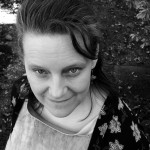Shelley Motz
 Shelley Marie Motz lives on the southernmost tip of Vancouver Island, British Columbia, on the unceded territory of the Songhees and Esquimalt First Nations. Culture, place, identity and the arts are prevalent themes in her life and in the essays, poems and stories that she writes. “Bury your Talent (Song of Solomon Redux)” was inspired, in part, by a quote from one of her favorite memoirs: How I Became Hettie Jones. This is her first publication in The Timberline Review. Other publication credits include Monday Magazine and the Globe and Mail.
Shelley Marie Motz lives on the southernmost tip of Vancouver Island, British Columbia, on the unceded territory of the Songhees and Esquimalt First Nations. Culture, place, identity and the arts are prevalent themes in her life and in the essays, poems and stories that she writes. “Bury your Talent (Song of Solomon Redux)” was inspired, in part, by a quote from one of her favorite memoirs: How I Became Hettie Jones. This is her first publication in The Timberline Review. Other publication credits include Monday Magazine and the Globe and Mail.
On your nightstand:
A pen, a new blank journal and a big pile of books. I am reading (and loving) The Ocean at the End of the Lane by Neil Gaiman. Once I’ve finished that novel, I plan to read Frog Moon by Emma Donoghue. I also have a couple essay collections on my nightstand: Voices of Humanism, edited by Gary Bauslaugh, and Knitting Yarns: Writers on Knitting, edited by Ann Hood. (Once my children return from their vacation, these books will likely be buried beneath copies of Captain Underpants and the latest Pokemon guidebook.)
If you could spend a day with an author, who would it be?
If I could spend a day with an author, it would be Ursula K. Le Guin. More than any other writer she inspires and challenges me. Aside from her wonderful storytelling and exquisite writing style, I appreciate the rich anthropological detail that she provides in her novels. Whether the world inhabited by her characters is real or fantastic, she includes ethnographic details that intrigue and delight me. I have been fortunate to meet many of my favorite writers but I regret that I have never had the opportunity to meet Ursula K. Le Guin.
What or who inspires you?
Many things inspire my writing, including the work of other artists. The poem that I have published in this edition of The Timberline Review was inspired, in part, by the memoir How I Became Hettie Jones. But it was also inspired by a jazz guitar solo, a line from the Song of Solomon, and a recipe for chicken gumbo. (Cooking is a high art form in my book.) Inspiration can also be intrinsic. As the daughter, granddaughter and great-granddaughter of refugees, I frequently explore concepts like identity and place (or displacement) in my work.